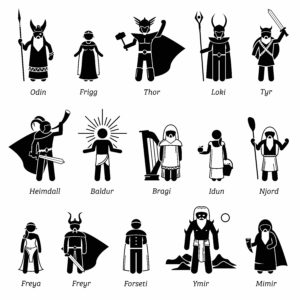
Many centuries ago, the ancient Norse peoples worshipped a wide range of deities. While the beliefs and practices never completely died out, they’ve seen a resurgence among modern pagans thanks to the Heathenry religious movement. Studying the Norse pantheon can lead to many fascinating revelations, including these deities’ purposes, social structures, and interpersonal relationships.
The Aesir: Rulers and Warriors
The New World Encyclopedia describes the Aesir as the “principal gods of the Norse pantheon” who called Asgard their home. Chief among them was Odin, the “all-father” god of wisdom and war, along with his wife Frigg, goddess of the sky, love, fertility, and marriage. Other Aesir deities include Odin’s brothers Vili, who gave humans the capacity to think and feel, and Vé, who empowered humans with the gift of speech.
As scholars pored over the Poetic Edda, the Prose Edda, and other older Norse texts, they found that some texts disagree on how to classify some Scandinavian gods and goddesses. However, they’ve deduced that this clan’s divine membership included several other warrior and ruler deities:
- Baldr, a son of Odin and Frigg and god of innocence and beauty
- Thor, a thunder and lightning deity who’s the son of Odin and the giantess Jord
- Loki, the offspring of two giants and blood-brother to Odin
- Tyr, the one-handed god of law and justice
- Idunn, goddess of fertility and keeper of the apples of immortality
- Bragi, a bard and the god of skalds
These deities’ origins, as well as the complex relationships between them, was humorously illustrated by artist Korwin Briggs in his online comic “Veritable Hokum.”
The Vanir: Deities of the Earth
In contrast, the Vanir clan encompasses many earth, fertility, and merchant deities who call Vanaheimr their home. Their high deities were Freyja, a goddess of love, beauty, and sexuality, and her brother Freyr, a fertility god associated with sunshine, rain, and plentiful crops. Lesser-known members of the Vanir include both Freyja’s and Freyr’s spouses as well as their father, Njord, a god of the wind and sea, and Njord’s wife, Skadi, a giant and huntress.
The Aesir-Vanir War
Several key writings discuss the relationships between the Vanir and the Aesir. According to both the Völuspá and Ynglinga Saga, the two clans once fought a long, drawn-out war before calling a truce and ending their hostilities. On his blog Norse Mythology for Smart People, historian Daniel McCoy describes this conflict as the result of the Aesir “blaming Freya for their own shortcomings,” as it began with their misuse of her magical powers.
Freyja was a powerful practitioner of “seidr,” a type of magic capable of altering future timelines and the fabric of destiny. Consequently, she’s also seen as an archetype from whom the concept of a “völva,” or female shaman, was derived. After arriving at Asgard, she offered her services to the Aesir, who soon gave into their selfish desires and strayed from their core values of kin loyalty, honor, and respect for the law. After the Aesir tried to kill her, the two clans battled each other, with the Aesir using military strikes and brute force while the Vanir employed magic tactics. According to McCoy, the fighting ended when both sides tired of fighting and agreed to exchange hostages, broker a treaty, and live in harmony with each other.
Deeper Principles Behind the Myths
Historians and scholars have extensively studied the ancient Scandinavian worldview through the writings and artifacts its civilizations left behind. Whether the Norse deities actually exist or they’re symbols for natural and ideological forces in our world remains to be seen. Nevertheless, these figures give us additional insight into how we humans continually try to make sense of the world around us.

